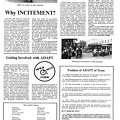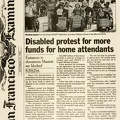The Washington Post, Metro Section 5/6/93
[Headline] The Disabled Plan to Show Washington They're Enabled—and Entitled
By Liz Spayd, Washington Post Staff Writer
Michael Auberger has shackled his wheelchair to city buses in Dallas. He has barricaded hotel entrances in San Francisco, and he has thrown himself in front of federal buildings, government officials, even oncoming traffic, all to draw attention to the rights of the disabled.
This weekend, Auberger and hundreds of other activists from across the country plan to converge on Washington for a three-day blitz of demonstrations and marches in what promises to be the largest protest in history for people with disabilities.
“We've written the letters, made the phone calls, had the meetings, and the bottom line is we're still being treated like second-class citizens." said Auberger, co-founder of ADAPT, an activist group that is spearheading the activities. “lf those channels don't work, you take to the streets."
Organizers say the immediate purpose of the demonstrations is to demand that the federal government commit more money to helping disabled people live at home, instead of in institutions. At the same time, they want to continue the larger campaign for equal rights that produced the Americans With Disabilities Act, landmark legislation that went into effect last year.
A march to the White House and a memorial service for Wade Blank, who was a leader in the movement, are expected to draw the largest crowds, both on Sunday. What may draw the most attention, however, are demonstrations on Monday and Tuesday, when protesters are expected to disrupt Washington with human blockades of buildings and streets.
The exact places and times for those actions aren't being disclosed, but the targets could include public buildings, such as the Capitol and the White House, and some federal agencies.
“We like to preserve the element of surprise," Auberger said.
ADAPT — an acronym for American Disabled for Attendant Programs Today — has been staging protests every six months for more than a decade to fight what it says is the inhumane treatment of the disabled at nursing homes and other institutions.
The group said it hopes to redirect 25 percent of the $23 billion in Medicaid funds currently budgeted for nursing homes into programs that would enable those with disabilities to have attendants in their homes. Currently, each state sets policy for how much Medicaid money will go toward attendant care programs, but there is no national policy.
[Subheading] Disabled Activists Plan 3-Day Protest
The strike on Washington is timed to pressure the Clinton administration into focusing on people with disabilities as part of its package of health care revisions, due out soon, activists said.
"Clinton has talked about change and says he wants people to be able to live at home, but what we're looking for is more than just words," said Bob Kafka, an ADAPT organizer in Texas who plans to bring a caravan of about 50 people to Washington.
In the past, ADAPT activists have drawn attention to their cause by employing sometimes sensational tactics.
They have done belly crawls across hotel lobbies in San Francisco, clawing at passersby. They have taken sledgehammers to street curbs in Denver to protest sidewalks that were inaccessible to wheelchair users. And they have swarmed and blockaded buildings in virtually every major U.S. city; a demonstration in Chicago last spring forced the evacuation of more than 1,000 American Medical Association workers and created disruptions in a half-dozen other downtown facilities.
Though such events have attracted media attention, some individuals and `groups` sympathetic to ADAPT’s cause question how effective they are in achieving the larger goal of attaining more money for in-home care.
“We're sympathetic to their concerns, but we think the tactics they use bring attention to ADAPT and not the problem," said Claudia Askew, a spokeswoman for the American Health Care Association, which represents 11,000 nursing homes and is a frequent target of ADAPT protests.
Disabled people also are somewhat splintered over whether ADAPT's approach helps or hurts their cause.
“There are people with disabilities that think ADAPT is a little extreme," said Patrick McCurdy, vice president of Marylanders for Adequate Attendant Care, a group that generally relies on peaceful protests and negotiations to lobby for in-home care.
McCurdy did defend ADAPT's technique as a necessary part of an overall approach to force change in a society that he said has long ignored the rights of disabled people.
Few spoke up for those rights until recently, but the Americans With Disabilities Act provided new protections to disabled people and helped forge a civil rights movement among the 43 million people with physical or mental impairments.
“A great byproduct of the [disabilities act] is the new sense of confidence and empowerment it has instilled within the disability community," said Justin Dart, chairman of the President's Committee on Employment of People with Disabilities, a small federal agency. “It's generated an enormous infusion of dignity and pride."
Gregory Dougan, a District resident, said the renewed sense of hope is one reason he will take part in Sunday's march. Dougan, who was born with cerebral palsy and uses crutches, said he is fortunate to be able to live at home. But several of his friends live in institutions because they can't get the in-home care they need. And on Sunday, Dougan said, he will be thinking of them.
"I'll be tired at the end of the day," he said, "but my crutches and me are going to that march."
- Author
- The Washington Post, Article by Liz Spayd
- Created on
- Tuesday 16 July 2013
- Posted on
- Thursday 12 September 2019
- Tags
- ADA, ADAPT - American Disabled for Attendant Programs Today, AHCA - American Health Care Association, blockade, Bob Kafka, Chicago, Claudia Askew, Greg Dougan, health care reform, Justin Dart Jr., Marylanders for Adequate Attendant Care, Medicaid, memorial, Mike Auberger, Patrick McCurdy, PCEPD - President's Committee on Employment of People with Disabilities, percent of money for nursing homes versus community attendant services, protests, redirect 25%, sensational tactics, Wade Blank, Washington DC, White House
- Visits
- 1384
- Rating score
- no rate
- Rate this photo


0 comments